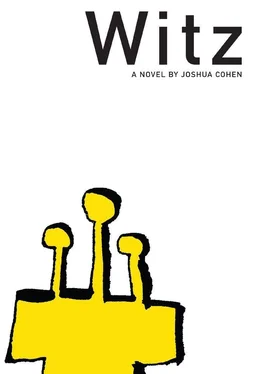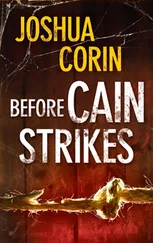Joshua Cohen - Witz
Здесь есть возможность читать онлайн «Joshua Cohen - Witz» весь текст электронной книги совершенно бесплатно (целиком полную версию без сокращений). В некоторых случаях можно слушать аудио, скачать через торрент в формате fb2 и присутствует краткое содержание. Год выпуска: 2010, Издательство: Dalkey Archive Press, Жанр: Современная проза, на английском языке. Описание произведения, (предисловие) а так же отзывы посетителей доступны на портале библиотеки ЛибКат.
- Название:Witz
- Автор:
- Издательство:Dalkey Archive Press
- Жанр:
- Год:2010
- ISBN:нет данных
- Рейтинг книги:3 / 5. Голосов: 1
-
Избранное:Добавить в избранное
- Отзывы:
-
Ваша оценка:
- 60
- 1
- 2
- 3
- 4
- 5
Witz: краткое содержание, описание и аннотация
Предлагаем к чтению аннотацию, описание, краткое содержание или предисловие (зависит от того, что написал сам автор книги «Witz»). Если вы не нашли необходимую информацию о книге — напишите в комментариях, мы постараемся отыскать её.
Meanwhile, in the not-too-distant future of our own, “real” world, another last Jew — the last living Holocaust survivor — sits alone in a snowbound Manhattan, providing a final melancholy witness to his experiences in the form of the punch lines to half-remembered jokes.
Witz — читать онлайн бесплатно полную книгу (весь текст) целиком
Ниже представлен текст книги, разбитый по страницам. Система сохранения места последней прочитанной страницы, позволяет с удобством читать онлайн бесплатно книгу «Witz», без необходимости каждый раз заново искать на чём Вы остановились. Поставьте закладку, и сможете в любой момент перейти на страницу, на которой закончили чтение.
Интервал:
Закладка:
In their chairs still, they bench: quickly, murmuring thanks, gratitude formulaic; one part conversation to one part actual prayer, the grace after meals, the mealy, measly gratuity Blessed art Thou King of the belch, the flatulent lounge, each of them though — meaning the guests and, too, the daughters, though never their hosts, the parents, who are immovable, like the boxes, crates, and trunks here at home — seated in a chair other than the one in which they’d eaten and drank, placed now at settings over coffee and coffeecake and tea more appropriate to their talking and dealings, more polite and refined and less of this shouting and screaming diagonally, over heads, under table, all over the room; presently directly across from, or more intimately next to, those whom in the course of these courses their interests have chosen, nearer to those with whom they share the most common worries or the interests of business, with whom they’re most compatible culturally, or if it has to come down to hobbies, pastimes, or the sharing of peeves.
Slowly, gradually amassing but then all at once risen, as if invited, requested by clap, or another bell rung, no one wanting to be the last to leave, to be a nuisance, a pest or worse: to be needed at the sink for the doing of dishes, to be called there without notice or chance for escape; a seizure to fake, a doctor’s note written, a lawyer’s exemption — the guests gather themselves, holding their stomachs full, then shuffling their chairs back under the table; and then: in wary glances and whispers the discharge of last pleasantries, fulfilling the barest, the basest, the least expectations; them offering to help with whatever needs helping: the cleaning, the sweeping or mopping, the prodigious returning of chairs; all gesture no followthrough, and, just as ritually, their offers are refused, refuted: they wouldn’t have offered if there was even the most remote hope of anything otherwise — and so they leave as they’d wanted to leave, with every excuse in the world at the ready and yet, having done the right thing, with their reputations still intact and appreciated, slowly, gradually, too, these goodbyes, and then toward the door, with their coats returned to them by the daughters from the bed of any spareroom upon which they’d been wrinkled.
We trust your girls, who wouldn’t, but they check their pockets anyway, you’d better believe. And then again, goodbye, and all over again this good-nighting, this hug and kiss, Shabbat Shalom and an entire family of finally gratuitous partings, separation leavetakings, you know the Thank You’s, I’m sure — some attractive and likable, others ugly and not. Misses Feigenbaum leaves without her husband, alone. And so maybe some silverware’s missing. Dessertplates, dessertspoons, are cleared, cups, nondairy receptacles, saucers and spoons, the tablecloth’s kissed, to be shaken out outside for the birds, curbside scavenge, washed in the washingmachine, dried in the dryer; it’s stained, Wanda’s bleached prohecy, it’ll come out, Hanna, I’ve forseen it, envisioned such from the detergent’s advertisements and packaging…who spilled, not me, says the eldest, not me, says the second eldest, not me, what about the boy in her belly, a punch or a kick, impossible, maybe, incredible — this pregnancy, it’s known stranger.
The pad’s folded into three parts, the kitchen chairs are returned to the kitchen with Hanna herself bringing the rest down to the basement…the sink’s overflowed and the counters alongside the sink, the refrigerator’s made room in for leftovers and in the freezer, too, and those down in the basement, Wanda’s come up again for air and with Rubina the diningroom chairs are now straightened.
One remembers, returns with the sponge. She cleans the table a bissele, uncomfortable with such despite every week, how she’s going at it lazily and a little distant, distracted, not really meaning it, who me, this kind of work, who do you think I am, and what exactly does being a family, a daughter membered thereof, make me responsible for — suddenly, fearful, she hurls the sponge at another, hits her smack between the eyes, the sponge slides down the nose leaving a wet, wormy trail. As if to say, you’re turning me into my mother…and then, another laughs and throws her sponge at yet another, angrily if not meant that way, and yadda, me three — and soon, they’re soaked in a roil of laughter, a wriggly giggle foamy and wild, with them hiding under the table and behind the chairs hidden and sought, but letting themselves be hit all the while, still tossing. Unparented, who could believe. Each daughter now has her own sponge: specially, and in differently coded colors, each seemingly aged and sized accordingly, sopping weighted, thick with the idle drip of the tap, waterswollen. Wanda moans, retires. As one gets hold of another, her head in her armpit, her head in her mouth, in the skirt’s stretch over the womb of the widely held knees as if in a gynecological lie — and sponges her hair, her feet thrashing her arms and hands along with them and then which are her hands and which are her feet in a whirl as if she’s being drowned upon the floor, warping its wood, they’re laughing still and louder than ever with the spit of saliva, food and drink heavied drool…
When at the Israelien’s, do as the Israeliens. Each family has its own customs, traditions: who does what first, who sits where, says what when, the meaning of certain words as spoken to certain people, what’s allowed and what’s not, prescribed vs. proscribed, and the deepest meanings of their eyes, too, colored in the same blood, they’re so wrecked; these are all given over, wait for it, there…in those looks, the anticipatory glances they give each other when guests arrive, the expectation of the always, the every week, the holy returned. But will things always remain the same, what about change — that’s asked as well: will these customs, these ways of being, of doing, as given over, handeddown to the youngest kinder as good as the Law, still remain? Slowly, gradually, over centuries even and beyond, millennial, hardening. Becoming writ in a script, old enough be believable. These habits, ritualistic obsessions, because the Law is the oldest obsession, with the hardest death, suffering — these are as sponges: how the skeleton remains, the spongin it’s called, after the sponge dies and its cells are scraped away; or else, all becomes synthesized in the spirit. And only then can it absorb, heavily, grow weighty with runoff; become malleable, bendable, stretchy. Wrungout. The sponge fight continues, its natural force unabated. But what is it, exactly, that seeps through the pores of the sponge, soaked in many times its own weight — lenses of soap, facets filling the eye. An unblemishing, a cleansing — each pore is a wound, pouring. Their father, Israel, the only one left at the table, seated sound at the head. His feet are stretched out and his toes are wriggling idly. His hands are on his stomach. Fingers at rest. He parts his lips, about to speak as if in reprimand — but instead, he halfburps, halfhiccoughs, as a sponge flies by an ear, barely missing. And he doesn’t even. Flinch or scold.
Night inhales through his nostrils, exhales in a puff, he slumps deeper, reclines: he’s stuffed, huffy about taking the pills he should, the indigestion, the heartburn, begin working out, the gout, his head…the table’s been sponged, at least wetted enough by the toss of his daughters, by the wastes of their throwing until hard as rocks then dried to stone with the air and the scuffle — and here’s one of them now with a new, laundered tablecloth to be placed upon the table again, then a vase of flowers, too, gifted tonight, irises, Hanna’s birth-flower by the secular calendar, placed atop that; how very thoughtful, and quiet. Unshatterable, a fading of steps, a pit pat, the dribble of daughtering wine to your tired. Makes you drunk with exhaustion. Dregs, disappeared. The kinder, who had showedoff and actedout throughout dinner, have now been exiled upstairs, upstairs-upstairs and are by this time, let’s hope or deny what really goes on around here, either sleeping or hiding, having been dismissed by only the silence, Israel’s refusal to yell — only the sigh of his disapproval, the slight heave of his lungs as lodged tight within the skin of his dinner. A button of his pants birthing loose, underwear thanks fat for elastic. Hanna comes in from the kitchen, and she and her husband moon around the diningroom, emptied. Relax, the drooly flow of smalltalk, lazy endearments, yawny reminders for Sunday’s household repairs…the faucets, they’re still running upstairs, and in Feigenbaum’s bathroom, the drip of the sink without sponge underneath to soak in with silence, the tappy leak it’s enough with it, and the hotwater heater — an industrial forehead, its veins pulsating madly; soup that’s been supped to cool, still frothing over the lip of a hairy pot…and suddenly, wet’s flooding everywhere, flooding from her, from her legs, between them cramped and spasmed, this is It, it might be — the Sabbath and how there’ll be no hospital visit, not because of the holy and its violation as much as because there’s no time and like Shabbos, you just have to believe: darkness eclipsing the diningroom, the candles burned down, absorbed into melt — disfigured weepers in wax, olden idolatrous forms of what she’s become, she’s becoming: a burnt huddle of the mothers before her; the rotations halted, globe’s guttered still, the revolutions snuffed out for the sniffing, their ashes…boxes bursting themselves out of their calendars, spinning emptied, negative, from their orderly orbits: it’s been these however many hundreds of days, xd out on the kitchen luach, the diary, the addressbook’s backcovered page, and some hours, minutes, seconds, prayers, shooty pains the stem of her standing, has to sit now, next to her husband, across, the swell flipflopping, huddling her weight to one side then the other, its haunch as if a cut from the butcher’s, those leanings to glean, the which aisled shelf reachings, hunching on line at the Shoprite, the Acme, ten items or less almost there, at the cashier, conveyor and then, the rush for the sink, the toilet, for the Pathmarked pathway vomiting her stoop, then her home…the shoving at the magazinerack, the candy and gum bumble and push, the elbows as knees and the toes up to tickle at the foot of her throat, the hands of the jaw straining through — the doorhinge, a head inclined in its mouth toward the dark that to Him must be light, has to be. Her shrieks and almost the smell of milk souring, not of treyf in and of itself but of mixtures forbidden, that or another burning…now waking the daughters, rousing them out of their beds, their rooms then down the halls to the stairhead, or, if not asleep — up, their eyes photoreddened already, tented, pillowcaved in their clubs — then pulling them downstairs gaggly ragged and demonstratively sleepy to lineup against the wall of the hall in any order fertility might urge and bear witness, enough room kitchen to dining. This is what you will be, what’ll happen to you. Only if.
Читать дальшеИнтервал:
Закладка:
Похожие книги на «Witz»
Представляем Вашему вниманию похожие книги на «Witz» списком для выбора. Мы отобрали схожую по названию и смыслу литературу в надежде предоставить читателям больше вариантов отыскать новые, интересные, ещё непрочитанные произведения.
Обсуждение, отзывы о книге «Witz» и просто собственные мнения читателей. Оставьте ваши комментарии, напишите, что Вы думаете о произведении, его смысле или главных героях. Укажите что конкретно понравилось, а что нет, и почему Вы так считаете.












